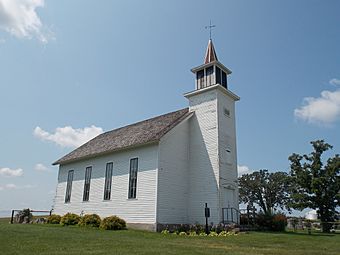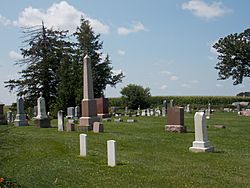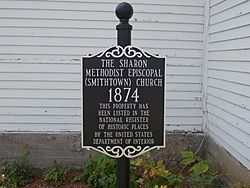Sharon Methodist Episcopal Church facts for kids
Quick facts for kids |
|
|
Sharon Methodist Episcopal Church
|
|

The Smithtown Church as it looked in 2014.
|
|
| Location | 1223 125th St., north of Lost Nation, Iowa |
|---|---|
| Built | 1874 |
| Architectural style | Italianate |
| NRHP reference No. | 03000745 |
| Added to NRHP | August 14, 2003 |
The Sharon Methodist Episcopal Church, often called the Smithtown Church, is a historic church in a rural part of Clinton County, Iowa, in the United States. It is special because it is the last building left from a small town called Burgess. The town was also nicknamed Smithtown. Because of its importance, the church was added to the National Register of Historic Places in 2003.
Contents
History of the Smithtown Church
The story of the Smithtown Church begins in 1865. A group of people formed the Sharon Methodist Church in the town of Burgess. A local landowner named George Reed gave land for a church and a cemetery. People began to be buried in the cemetery soon after, but the church building wasn't finished until 1874.
Sharing the Church Building
Building the church was difficult because there was not much money in the 1870s. In 1875, another church group, the St. John's Congregation of the German Reformed Church, helped pay for the building. They paid for one-fourth of the cost. In return, they were allowed to use the church for their services one-fourth of the time.
The two groups shared the church for many years. The Methodist ministers came from the nearby town of Monmouth, Iowa. The Reformed Church ministers came from Wheatland.
Why the Town of Burgess Disappeared
In 1871, a new railroad was planned for the area. However, the tracks were built two miles south of Burgess. A new town called Lost Nation grew up around the railroad station. Many businesses from Burgess, like the general store, moved to Lost Nation to be near the train.
Over time, the town of Burgess faded away, but the church remained. Regular church services stopped in the late 1920s. After that, the building was used for special events like funerals. In 1929, the Smithtown Cemetery Association was created to take care of the church and cemetery. In 1970, the association gave the property to the Clinton County Conservation Board to protect it as a historic site.
Architectural Style
The Smithtown Church is a wooden building designed in the Italianate style. This style was popular in the 1800s.
The front of the church has a tall, central bell tower with the main entrance at its base. At the very top of the tower is a belfry, where the bell hangs, and a short spire. Each side of the church has four large, rectangular windows with shutters.





